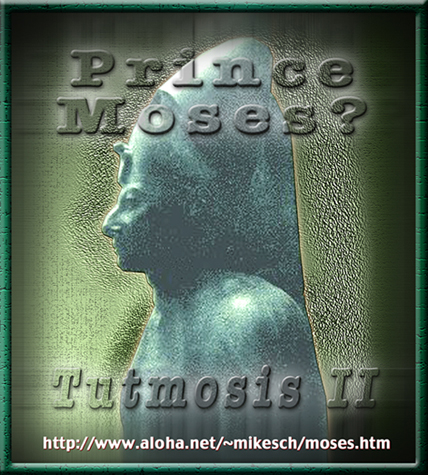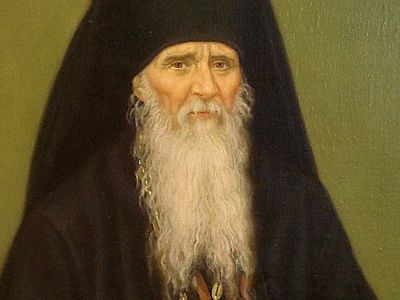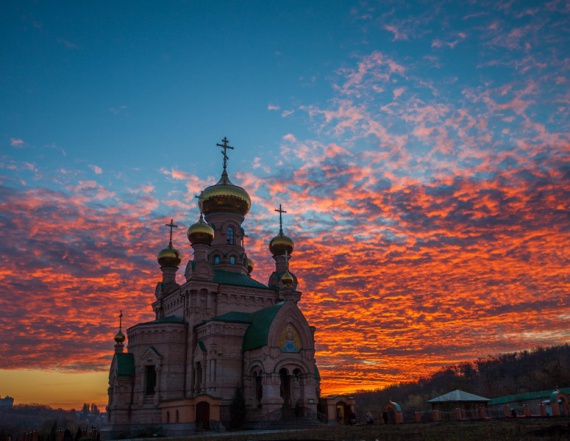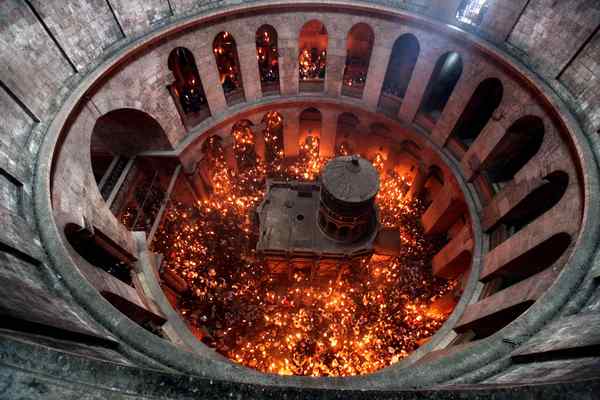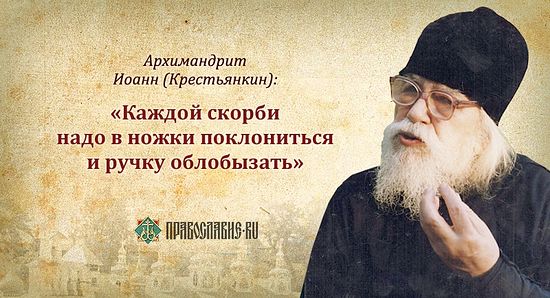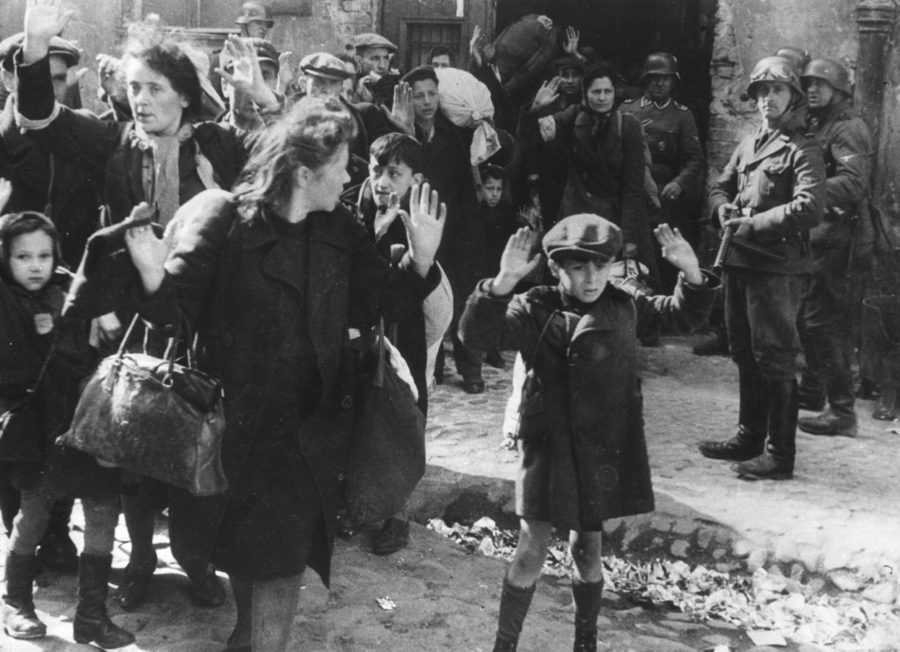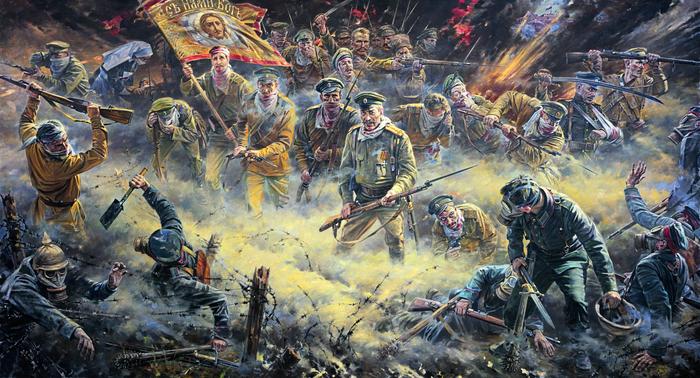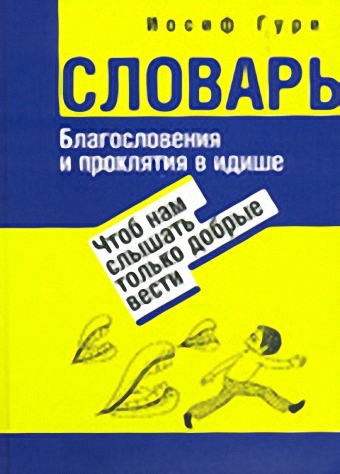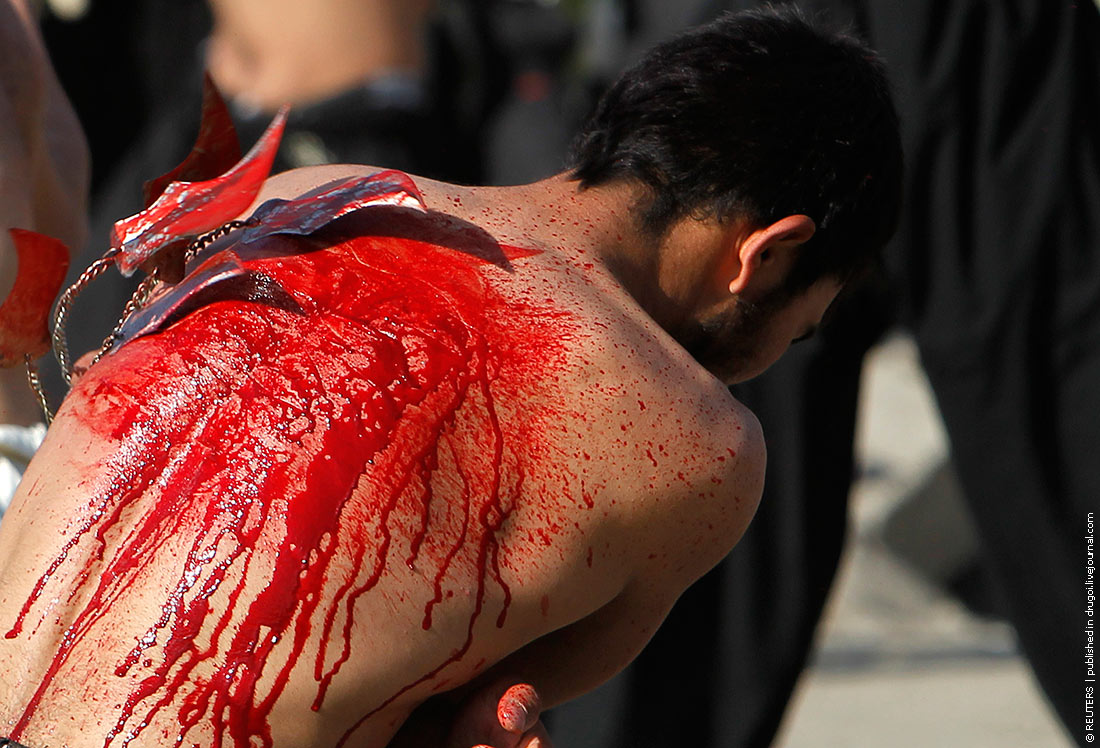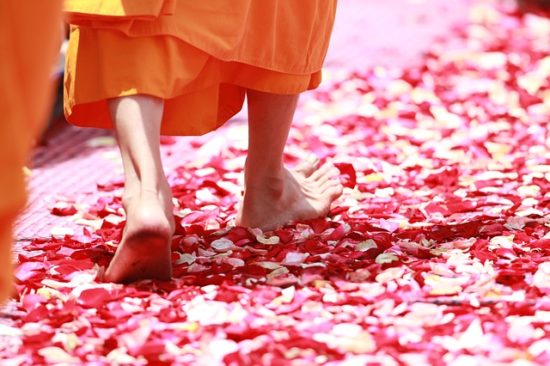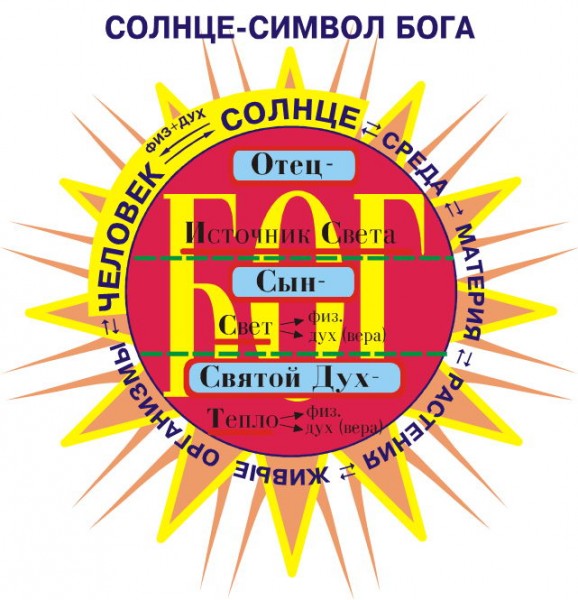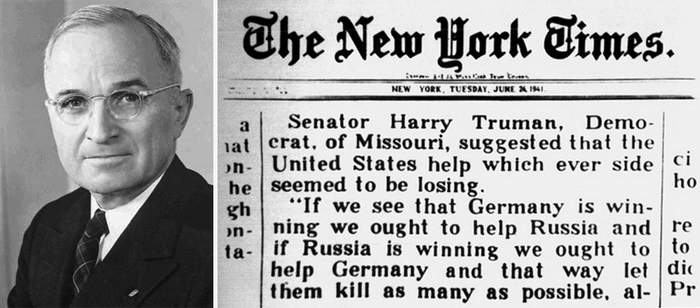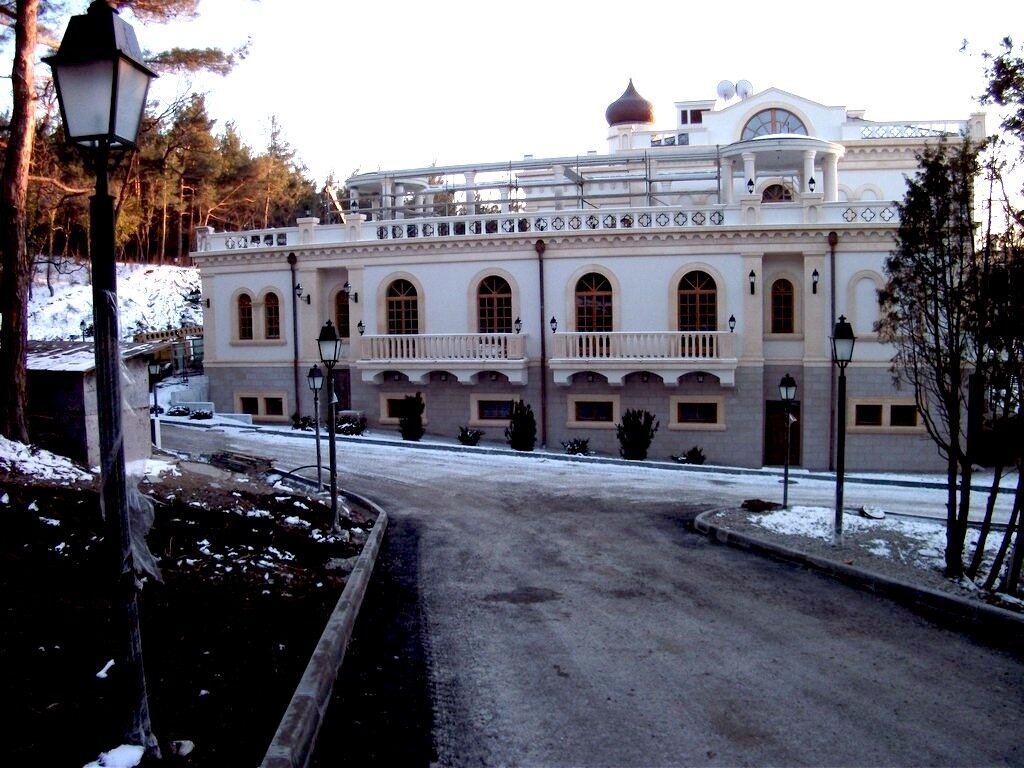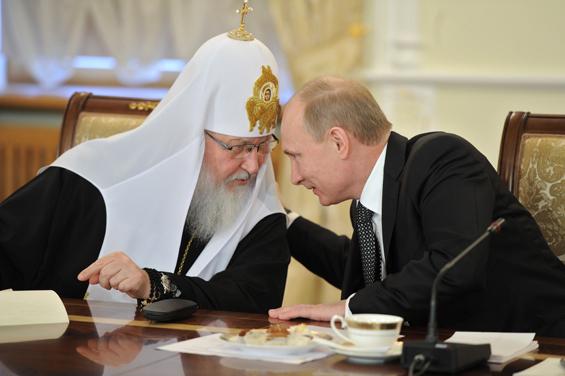Rev. Ambrose Elder of Optina Desert. Short life
Many people flock to Optina Desert to the cancer with the relics of St. Ambrose of Optina. The veneration of this saint began long ago, during his lifetime. Ambrose did not have an important title, was neither hegumen nor archimandrite. This saint reposed in the dignity of a simple Jeroskhimonakh. However, he achieved such holiness that the rumor spread not only throughout Russia, but also abroad.
The beginning of life
Rev. Ambrose Optinsky (biography will be described below) was born in 1812, December 5, according to a new style. In the world bore the name of Alexander Mikhailovich Grenkov. The life of Ambrose Optinsky began in the village of Big Lipovitsa, Tambov province.Sasha’s grandfather was a priest in the village, and his father served as a priest. The boy was the sixth child, after which two more children were born. There were eight children in the Grenkov family: four boys and four girls.
Informative! : what are the tablets and what is the meaning
At the birth of Alexander in the house gathered a lot of guests. On this occasion, the monk subsequently often joked: "I was born in public and spend my whole life in public." Sasha grew up nimble, cheerful fidget, often naughty. I learned the letter from the Hourglass and the Psalms. On Sunday and church holidays, the boy sang and read with his father on the choir.
Father left early in another world, leaving his mother with eight children alone. The family had to move to the grandfather-priest. When the boy was twelve years old, he was sent to a spiritual school.
Sasha studied well and after graduation he entered the theological seminary, which he also graduated with honors. After that, he did not enter the theological academy and the dignity was also in no hurry to accept, as if thinking about the future path.
Ambrose Optinsky in the world was distinguished by a cheerful disposition, an excellent sense of humor and was the soul of any company. He often joked and thereby made his friends laugh.
 After the seminary, Alexander Grenkov taught for some time at the Lipetsk Theological School and gave private lessons to the children of the landowners.
After the seminary, Alexander Grenkov taught for some time at the Lipetsk Theological School and gave private lessons to the children of the landowners.
When he was still in his last year at seminary, he became seriously ill. And then he prayed tearfully to God for his own healing, promising to become a monk in the event of recovery. The young man recovered and did not forget his promise to the Lord, but for the time being he did not dare to cut his hair as a monk, he put off this decision. Most likely, he doubted whether he could become a good monk with such love of life, mobility and a cheerful disposition.
So time went on, the young man worked, had fun in his spare time, spent time in noisy companies. But more and more he felt pangs of conscience, as if someone had been rushing to fulfill his promise. And then one day while walking Ambrose Optinsky in the forest I heard a voice in the murmur of a brook: “Praise God! Save God! ” Then he began to earnestly pray to the Mother of God to reason him and strengthen him.
Monasticism
At that time, the perspicacious old man Illarion lived in the Tambov province. Alexander also went to him for instructions on which monastery to enter. The ascetic replied: "Go to the Optina Desert, you are needed there." But even after this, the young man did not immediately rush to the monastery, but continued to work.
 During the summer holidays, together with a colleague went on a pilgrimage to the Trinity-Sergius Lavra. There Alexander fervently prayed for God's help. Upon returning from the monastery, he continued to live in peace, still doubting the adoption of monasticism.
During the summer holidays, together with a colleague went on a pilgrimage to the Trinity-Sergius Lavra. There Alexander fervently prayed for God's help. Upon returning from the monastery, he continued to live in peace, still doubting the adoption of monasticism.
But one day after another friendly party, Alexander especially felt remorse for an unrestrained vow to God. The future ascetic spent all night in repentance and tearful prayer, and in the morning left home forever. Fearing that relatives would not interfere with his plans, he did not tell anyone.
Arriving in the Desert, Alexander found old age in full swing. Old age was developed in Russia from antiquity. Usually the elders were called monks who achieved a certain spiritual experience through asceticism, unceasing prayer. These people had the gift of perspicacity, healing, therefore, people from all over the country flocked to them to receive advice and spiritual instructions.
 The first Optina Elder was the Rev. Leo (1768–1841), who laid the foundation for senility in this monastery. Then his followers were: Macarius, Moses, Anthony, Hilarion. The young Alexander Grenkov, who arrived in the Desert, found the venerable Leo and Macarius, the pillars of old age, still alive. The day of arrival at the monastery is December 8, 1839.
The first Optina Elder was the Rev. Leo (1768–1841), who laid the foundation for senility in this monastery. Then his followers were: Macarius, Moses, Anthony, Hilarion. The young Alexander Grenkov, who arrived in the Desert, found the venerable Leo and Macarius, the pillars of old age, still alive. The day of arrival at the monastery is December 8, 1839.
Alexander, upon arrival in the Desert, immediately found Elder Leo with the goal of taking a blessing from him for monastic life. The monk blessed the young man to live at first in a monastery hotel and to translate a spiritual book.
A month later, the elder allowed Alexander to live in the monastery itself, without putting on a cassock. It was necessary to settle matters with the school authorities, where Grenkov taught and to expect the decree of the bishop to enroll him in the staff of the monastery.
Only six months later, Alexander was allowed to put on a cassock and live as a novice in the Desert. At first, he worked in a bakery and was a cell-maker with the old man Leo. Then the young novice was transferred to Skeet, where he often met with the old man Macarius.
 There Alexander also worked as a cook, and in his free time he went to the old man Leo. The elder loved him very much, affectionately calling him "Sasha." Soon Leo, feeling his near death, said to Macarius: "I am passing this novice to you."
There Alexander also worked as a cook, and in his free time he went to the old man Leo. The elder loved him very much, affectionately calling him "Sasha." Soon Leo, feeling his near death, said to Macarius: "I am passing this novice to you."
After the death of Leo, Alexander became the cell-maker Macarius. In 1841, the novice was trimmed in a riassophore, and a year later - in a mantle named Ambrose (in honor of St. Ambrose of Mediolansky). In 1843 he became a hierodeacon, and two years later - a hieromonk.
Since then, Ambrose Optinsky felt a deterioration in health, caught a cold and received a serious complication in his internal organs. In his spiritual instructions he often said that illnesses bring great benefit to the soul. The patient does not require the works of asceticism, but only patience and prayer.
Throughout his monastic life, the saint meekly endured constant illnesses. His gastritis worsened, vomiting began, then neurological pains appeared, or kidneys hurt. Despite his illness, Ambrose, with the blessing of Macarius, translated spiritual books, and most importantly, taught the young monk unceasing clever prayer.
Important! The Jesus prayer, otherwise called “smart,” is performed by monks and pious lay people. It consists in uttering the words in the heart with the mind "Lord, Jesus Christ, Son of God, have mercy on me a sinner." Usually they help her to pronounce the rosary - so you can find out how many times the prayer has been read.
Old age
 In 1860, Elder Makarios reposed, Ambrosius took over. By that time, he had already attained holiness and received people for 12 years with the blessing of Macarius. So the words of St. Hilarion came true, Ambrose Optinsky became an old man after the death of Macarius.
In 1860, Elder Makarios reposed, Ambrosius took over. By that time, he had already attained holiness and received people for 12 years with the blessing of Macarius. So the words of St. Hilarion came true, Ambrose Optinsky became an old man after the death of Macarius.
In the photo, the saint is often depicted lying on the bed (in this position he received visitors, because he did not have the strength to stand up due to illness). But the face is always bright and joyful in the photo of those years.
Radiant, kind eyes, an open smile are visible. In 1862, the saint finally went to bed, could no longer attend divine services, therefore he received communion in the cell. But, despite this, he did not stop accepting flows of visitors, answering letters.
Informative!Who is he and what helps people
The saint had a sharp mind and a great sense of humor, often joked, and also knew how to compose poetry. The teachings of the old man Ambrose Optinsky were almost all in poetic, half-joking form.
Everyone knows his words:
- "You can live in the world, but not in the jury, but live quietly."
- “To live is not to push, not to condemn anyone, not to annoy anyone, but to all my respect.”
- Often the old man said: "To live in a monastery, you need patience, not a cart, but a whole cart."
- “Monks cannot be cured, but only sometimes healed.”
- "Do not boast, peas, that you are better than beans, get wet - you burst yourself."
- “The church should not speak. Sorrows are sent for this. ”
 The rumor of a good and wise old man soon spread throughout Russia. People of different classes came to Optina deserts: rich and poor, he did not make a distinction between people, he accepted everyone equally with love. Such famous writers as Leo Tolstoy and Dostoevsky came to the old man.
The rumor of a good and wise old man soon spread throughout Russia. People of different classes came to Optina deserts: rich and poor, he did not make a distinction between people, he accepted everyone equally with love. Such famous writers as Leo Tolstoy and Dostoevsky came to the old man.
Amazing was his insight. There was a case when an unbelieving young lady was brought to him, who all the way called Ambrose a hypocrite and did not believe in his holiness. When all the people were waiting for the elder to leave, Vera (that was the name of the unbelieving young lady) walked nervously back and forth around the room.
And when the girl was outside the door in the corner, the door suddenly swung open, the old man came out and said, looking out the door: “Who is here with us?” And, this is Vera, she came to look at the hypocrite! ” It was so sudden and amazing that the girl immediately forgot about her unbelief and fell to her knees.
Shamordinsky cloister
In the last years of his life, the elder began to arrange a convent in Shamordino (located 12 miles from Optina Desert). He nurtured this monastery spiritually until his death. It is known that one of the Shamordin nuns was the sister of Leo Tolstoy, Maria Nikolaevna Tolstaya.
 The nuns loved the reverend and often prayed for his health. Sometimes the reverend was even angry with them: “They again prayed!”
The nuns loved the reverend and often prayed for his health. Sometimes the reverend was even angry with them: “They again prayed!”
The elder departed to the Lord on October 22, 1891 in the Shamordinsky monastery. Before his death, he adopted the great schema. The image of the saint formed the basis of the work of Dostoevsky "The Brothers Karamazov." Just as in the novel, in fact, from the relics of it at first came the smell of decay. This was predicted by Ambrose during his lifetime. But later the stench disappeared, and a wondrous fragrance spread.
Useful video: the life and instruction of Ambrose Optinsky
Veneration of the saint
St. Ambrose of Optina was canonized by the Orthodox Church in 1988, a memorial day is October 23 and July 10 in a new style. On commemoration day, crowds of people flock to the Vvedensky Cathedral of Optina Desert, where the relics of Ambrosius of Optina rest. There is also an icon of Ambrose Optinsky, from which many receive healing from diseases. The icon depicts an old man in a schema, as he was buried.
Many are interested in what does St. Avmrosiy of Optina help?
The old man is prayed in various cases:
- with various diseases of the physical and mental (including raging);
- in case of family strife, quarrel, divorce;
- in the desire to find a companion (life partner);
- in official turmoil;
- about children who are not given education;
- about the admonition of lost children.
And much more than that helps the saint to those who pray to him in prayers.
The female monastery of Ambrose of Optina is located in Belarus at the site of the miraculous icon of the Mother of God of Zhirovichi. In 2005, it received the status of a monastery, and it was decided to name it in honor of Ambrose Optinsky. So the veneration of the saint spread outside Russia, in Belarus.
Interesting!The monastery is currently under construction, although some churches are already operational.
Useful video: indicating the path to the salvation of Ambrose Optinsky
Output
St. Ambrose of Optina made an invaluable contribution to the domestic eldership. He became a beloved saint for many people. They pray to him in various troubles and needs, and the reverend always helps. Even after death, he continues to love the people and cordially responds to requests addressed to him.
In contact with
Rev. AMVROSIY OPTINSKY († 1891)
The Monk Ambrose was the third most famous and illustrious of all the Optina Elders. He was not a bishop, archimandrite, he was not even hegumen, he was a simple hieromonk. Metropolitan Filaret of Moscow before the relics of our father Sergius of Radonezh once very well said about the humility of the saints: “Here I hear all around Your Eminence, Your Eminence, you alone, Father, are simply reverend.”
That was Ambrose, the elder of Optina. He could speak his language with everyone: to help an illiterate peasant woman who complained that turkeys were dying, and the lady would drive her out of the yard. Answer the questions of F.M. Dostoevsky and L.N. Tolstoy and other, the most educated people of that time. It was he who became the prototype of the old man Zosima from the novel “The Brothers Karamazov” and the spiritual mentor of all Orthodox Russia.
Alexander Grenkov, future father Ambrose, was born on November 21 or 23, 1812 , in the spiritual family of the village of Big Lipovitsy of the Tambov Diocese, grandfather - a priest, father, Mikhail Fedorovich - a sexton. Before the birth of the child, so many guests arrived at the grandfather-priest that the puerpera, Marfa Nikolaevna, was transferred to the bathhouse, where she gave birth to a son, named in holy baptism in honor of the noble Grand Duke Alexander Nevsky, and in this turmoil she forgot which one the number he was born. Later, Alexander Grenkov, having already become an old man, joked: “As I was born in public, so I live in public.”
Alexander was the sixth of eight children in the family. At age 12, he entered the Tambov Theological College, which he brilliantly graduated from the first of 148 people. Then he studied at the Tambov Seminary. However, he did not go to the Theological Academy or to the priests. For some time he was a home teacher in one landowner family, and then a teacher at the Lipetsk Theological School. Possessing a lively and cheerful character, kindness and wit, Alexander was very loved by his comrades. Before him, full of strength, talented, energetic, lay a brilliant life path, full of earthly joys and material well-being. In the last class of the Seminary, he had to endure a dangerous disease, and he vowed to get a haircut as a monk if he recovered.
Upon his recovery, he did not forget his vow, but for four years he postponed his fulfillment, “huddled”, in his expression. However, conscience did not give him rest. And the more time passed, the more painful became reproach of conscience. Periods of carefree fun and carelessness were replaced by periods of acute melancholy and sadness, intense prayer and tears. Once, while already in Lipetsk, walking in the neighboring forest, he, standing on the bank of a stream, clearly heard the words in his murmur: "Praise God, love God ...".
At home, secluded from prying eyes, he fervently prayed to the Mother of God to enlighten his mind and direct his will. In general, he did not have a persistent will and in old age he said to his spiritual children: “You must obey me from the first word. I am a compliant person. If you argue with me, I can yield to you, but it will not be to your advantage. ”. Exhausted by his indecision, Alexander Mikhailovich went for advice to the well-known ascetic Hilarion who lived in that area.“Go to Optina, - the old man told him “And you will be experienced.”
After tears and prayers in the Lavra, secular life, entertaining guests, seemed to Alexander so unnecessary, unnecessary, that he decided to urgently and secretly leave for Optina. Perhaps he did not want the persuasion of friends and relatives to shake his determination to fulfill the vow to devote his life to God.

Holy Vvedensky Stavropegial Monastery Optina Deserts

Optina Deserts. Vvedensky Cathedral
In the fall of 1839 he arrived at Optina Desert, where he was affectionately received by the old man Leo. Soon he took the tonsure and was named Ambrose, in memory of the saint Mediolansky, then he was ordained a hierodeacon and, later, a hieromonk. It was five years of labor, ascetic life, hard physical work.
When the famous spiritual writer E. Poselyanin lost his beloved wife, and friends advised him to leave the world and go to the monastery, he answered: “I would be glad to leave the world, but in the monastery they will send me to work at the stable”. It is not known what obedience would have been given to him, but he truly felt that in the monastery they would try to humble his spirit in order to turn him from a spiritual writer into a spiritual worker.
So Alexander had to work in a bakery, bake bread, boil hops (yeast), help the cook. With his brilliant abilities, knowledge of five languages, it was probably not easy for him to become just an assistant cook. These obediences cultivated in him humility, patience, the ability to cut off his will.
For some time he was a cell attendant and a reader of the elder Leo, who especially loved the young novice, affectionately calling him Sasha. But out of educational impulses he experienced his humility in public. Pretended to rattle against him with anger. But he said to others about him: "There will be a great man." After the death of Elder Leo, the young man became the cell-man of Elder Macarius.

|
 |
|
Rev. Leo of Optina |
Rev. Macarius of Optina |
Soon after his ordination, exhausted by fasting, he caught a cold. The disease was so severe and prolonged that it forever undermined the health of Father Ambrose and almost confined him to bed. Owing to his morbid condition, until his death, he could not perform the liturgy and participate in long monastery services. For the rest of his life, he barely moved, suffered from perspiration, so that he changed clothes several times a day, could not stand the cold and drafts, he ate only liquid food, in an amount that was barely enough for a three-year-old child.

Comprehended about. Ambrosia was a serious illness for him undoubtedly providential significance. She tempered his living character, protected him, perhaps from developing self-conceit in him, and made him go deeper into himself, better understand both himself and human nature. Not for nothing subsequently about. Ambrose said: “It’s good for a monk to get sick. And the disease does not need to be treated, but only to heal! ”.
Perhaps, none of the Optina elders carried such a heavy cross of the disease as St. Ambrose. The words came true on it: "The power of God in weakness is being accomplished."Despite the illness, Father Ambrose remained as before in complete obedience to Elder Macarius, even in the slightest thing he gave an account to him. With the blessing of the elder, he was engaged in the translation of patristic books, in particular, he prepared for publication the “Ladder” of St. John, Father Superior of Sinai, letters and biography of Fr. Macarius and other books.

In addition, he soon began to gain the fame of an experienced mentor and leader in matters of not only spiritual, but also practical life. During the life of the elder Makarii, with his blessing, some of the brethren came to Fr. Ambrose for the revelation of thoughts. So Elder Macarius gradually prepared for himself a worthy successor, joking about this: “Look, look, look! Ambrose is taking bread from me. ” When Elder Macarius died, the circumstances were such that Fr. Ambrose gradually took his place.
He possessed an unusually lively, sharp, observant and penetrating mind, enlightened and deepened by constant concentrated prayer, attention to himself and knowledge of ascetic literature. Despite his constant illness and frailty, he combined inexhaustible cheerfulness, and was able to give his instructions in such a simple and playful form that they were easily and forever remembered by everyone listening:
"We have to live on the earth as the wheel spins, touches the earth with one little point, and strives upward for the rest; but we, as we lay down, cannot get up."
"Where it is simple, there are about a hundred angels, and where it is wise, there are not one."
"The peas did not boast that you are better than beans; if you get wet, you burst yourself."
"Why is a man bad? - Because he forgets that God is above him."
"He who thinks of himself that has something, he will lose."
"Living easier is best. Don’t break your head. Pray to God. The Lord will arrange everything, only live easier. Don’t torture yourself, thinking about how and what to do. Let it be - how it happens - it is easier to live."
"You need to live, not to bother, not to offend anyone, not to annoy anyone, and all my respect."
"To live - not to bother - everyone should be happy. There is nothing to understand here."
"If you want to have love, then do love deeds, even if first without love."
Once they said to him: “You, father, are very simple to say”, the old man smiled: “Yes, I asked God for twenty years of this simplicity”.
The elder received crowds of people in his cell, refused no one, the people flocked to him from all over the country. So for over thirty years, day after day, Elder Ambrose performed his feat. Before the father of Ambrose, none of the elders opened the doors of his cell to a woman. He not only received many women and was their spiritual father, but also founded a women's monastery near the Optina Desert - the Kazan Shamordinsky Desert, which, unlike other convents of that time, accepted more poor and sick women.
The Shamorda monastery first of all satisfied that ardent thirst for mercy for the afflicted, which Fr. was always full of. Ambrose. He sent many helpless here. The elder took the most lively part in the construction of the new monastery. They will bring, it used to be, dirty, half-naked, covered with rags and a rash from the uncleanness and exhaustion of the child. “Take him to Chamordino,” the old man orders (there is a shelter for the poorest girls). Here, in Chamordino, they didn’t ask if a person was able to bring benefit and deliver benefit to the monastery, but they simply accepted and reposed everyone. By the 90s of the XIX century, the number of nuns in it reached 500 people.

Father Ambrose did not like to pray in plain sight. The cell man, who read the rule, had to stand in another room. Once, the prayer canon of the Theotokos was read, and one of the skits hieromonks decided at that time to approach the priest. Eyes about Ambrose was directed to heaven, his face was radiant with joy, a bright radiance rested on him, so that the sacred man could not bear it.

From morning until night, the old man, dejected by the disease, received visitors. People came to him with the most burning questions, which he assimilated to himself, with which he lived at the moment of conversation. He always grasped the essence of the matter at once, incomprehensibly wisely explained it and gave an answer. There were no secrets for him: he saw everything. A stranger could come to him and be silent, but he knew his life, and his circumstances, and why he came here. From day-to-day reports, the cell men, now and then leading to the old man and taking visitors out, barely kept on their feet. The old man himself sometimes lay without feelings. Sometimes, in order to alleviate the fogged head to some extent, the old man ordered one or two of Krylov's fables to be read.
As for healings, they did not have a number and it is impossible to list them. The elder in every possible way covered these healings. Sometimes he, as if in jest, bangs his hand on the head, and the disease goes away. It happened that a reader who recited prayers suffered from severe toothache. Suddenly the elder hit him. Those present grinned, thinking that the reader had made a mistake in reading. In fact, his toothache stopped. Knowing the old man, some women turned to him: “Father Abrosim! Beat me, my head hurts. "

From all over Russia, the poor and rich, the intelligentsia and commoners flocked to the old man’s shack. And he received everyone with the same love and favor. Grand Duke Konstantin Konstantinovich Romanov and F.M. came to him for advice and for conversation. Dostoevsky, V.S. Soloviev, K.N. Leontiev (monk Clement), A.K. Tolstoy, L.N. Tolstoy, M.P. Pogodin and many others. V. Rozanov wrote: “The beneficence from him pours spiritual, and, finally, physical. Everyone rises in spirit, only looking at him ... The most principled people visited him (Fr. Ambrose), and no one said anything negative. Gold went through a fire of skepticism and did not fade. ”

The spiritual strength of the elder was sometimes manifested in completely exceptional cases. Once, Elder Ambrose, bent, leaning on a wand, from somewhere walked along the road to the monastery. Suddenly a picture appeared to him: a loaded cart was standing, a dead horse was lying nearby, and a peasant was crying over it. The loss of a breadwinner in peasant life is a real misfortune! Approaching the fallen horse, the old man began to slowly go around it. Then, taking a twig, he whipped a horse, shouting at it: “Get up, you lazy dog!” - and the horse obediently got to its feet.
The hour of his death was destined to meet the elder Ambrose in Chamordino. On June 2, 1890, as usual, he went there for the summer. At the end of summer, the elder tried three times to return to Optina, but could not because of ill health. After a year, the disease intensified. He was congregated and communed several times. Suddenly the news came that the bishop himself, dissatisfied with the slowness of the old man, was going to come to Chamordino and take him away. Meanwhile, Elder Ambrose weakened every day. October 10, 1891 the elder, having sighed three times and having crossed himself with difficulty, died . And now - barely the bishop managed to drive half the way to Shamordin and stopped to spend the night in the Przemysl monastery, when they sent him a telegram notifying him of the death of the old man. The bishop changed his face and confusedly said: “What does this mean?” The bishop was advised to return to Kaluga, but he replied: “No, probably this is the will of God! The bishops do not burry simple hieromonks, but this is a special hieromonk - I want to make the funeral service for the old man myself. ”

It was decided to transfer him to Optina Desert, where he spent his life and where his spiritual leaders, the elders Leo and Makarii, rested. From the body of the deceased, a heavy, deadly smell soon began to be felt.
However, for a long time he had been directly speaking to his cell-mate about Fr. Joseph. To the latter’s question, why so, the humble old man said: “This is for me because in my life I have taken too much undeserved honor”. But it’s wonderful that the longer the body of the deceased stood in the church, the less the smell of death was felt. And this despite the fact that from the multitude of people, over the course of several days almost not departing from the tomb, there was unbearable heat in the church. On the last day of the funeral service of the old man, a pleasant smell began to be felt from his body, as if from fresh honey.

Under the drizzling autumn rain, not one of the candles surrounding the coffin went out. The old man was buried on October 15, on that day, the elder Ambrose set up a feast in honor of the miraculous icon of the Mother of God, the “Sporegator of the Breads", before which he himself offered his fervent prayers many times. The marble tombstone engraved with the words of the Apostle Paul:“By the weak, how weak, but I gain weak. All of them all, but I will save every one ”(1 Cor. 9:22).

Icon over the cancer of the holy elder Ambrose - streams.
In June 1988, the Local Council of the Russian Orthodox Church, St. Ambrose, the first of the Optina Elders, was canonized.On the anniversary of the revival of the monastery, by the grace of God, a miracle happened: at night after the service in the Cathedral of Vvedensky, the Kazan icon of the Mother of God was streamed, the relics and the icon of St. Ambrose. Other miracles were performed from the relics of the elder, with whom he certifies that he does not leave us sinners by his intercession before our Lord Jesus Christ. Glory to him forever, Amen.
.jpg)
Troparion, voice 5:
As for a healing spring, we flow to you, Ambrose, our father, you are rightly instructing us to save us in prayer from troubles and misfortunes, console yourself in bodily and spiritual sorrows, and learn more than humility, patience and love, pray to the Humanity Christ and The Intercessor, the Zealous, is saved to our souls.
Condac, voice 2:
Having fulfilled the covenant of the Shepherd, the elders inherited grace, hurting our hearts for all those who come to you with faith, and we, your child, love with a cry of ty: Father Holy Ambrose, pray to Christ God to be saved for our souls.
Prayer to St. Ambrose the Old Man of Optina
Oh, great old man and servant of God, our Father Ambrose is reverend, Optinskaya praised all Russia for the teacher of piety! We glorify your humble life in Christ, even God exalted your name, still existing on the earth, but most of all crowning heavenly honor after your departure to the hall of eternal glory. Accept now the prayer of us who are unworthy of your children, who honor thee and invoke your holy name, deliver us by your intercession before the Throne of God from all sorrowful situations, spiritual and bodily ailments, evil misfortunes, corruptive and crafty temptations, God blesses us from our Fatherland silence and prosperity, be the indispensable patron of this holy monastery, and even in prosperity he himself worked and was pleased by everyone in the Trinity to our glorious God, Him all glory, honor and worship be appropriate for Him, the Father and the Son and the Holy Spirit, now and forever, and forever and ever. A min.
OPTINA DESERT (2010)
Memory: October 10/23 (Optina Elders Cathedral), October 11 / October 24, June 27 / July 10 (gaining relics)
On this day, 200 years ago, Alexander Mikhailovich Grenkov was born, known to all Orthodox Christians as the Monk Ambrose Optinsky. At the age of 35, he becomes virtually completely disabled. In this case, pr. Ambrose - a perspicacious old man and ascetic - was distinguished by an unusually good-natured, cheerful disposition.
In ancient Russia there was a special idea of \u200b\u200bbeauty - a person endowed with spiritual gifts, almost always possessed physical beauty. The connection between a healthy body and a strong spirit is a very old idea, dating back to the Old Testament. In those days, illness was considered a punishment for sins, and the faithful Jew in his prayers thanked God every day for not being a woman, not a child, and not a leper. And in our days it is often possible to meet "theological" arguments that the illness of a child is certainly a punishment for the sins of the parents, and the sight of an unhealthy person allows some believers to reflect on the topic of who sinned - the unfortunate person or his parents.
Meanwhile, among Christian saints there were always people who today would be called disabled. 200 years ago in 1812 Alexander Mikhailovich Grenkov was born, known to all Orthodox Christians as the Monk Amvrosiy Optinsky.
When reading the life and memories of it, it is difficult to immediately understand that the image of an old man walking with a wand or lying in his cell actually refers to a young man who has not yet reached forty years of age. It was then that the saint had the first signs of an illness that accompanied him until his death.
In December 1845, Father Ambrose went from Optina Desert to Kaluga for initiation in Hieromonk. It was cold autumn, and during the trip the 33-year-old man caught a cold and “felt a strong pain in his stomach”. After this, his hands began to grow numb, and Father Ambrose could not stand for a long time with a chalice, sweeping the believers.
Rev. Ambrose of Optina. Photos
At the age of 35, he becomes completely disabled, incapable of worship, and remains in the monastery for the state. He survived, but until the end of his days suffered from inflammation (catarrh) of the mucous membrane of the stomach and intestines, vomiting, bleeding, and constant fever, followed by chills.
Moreover, the Monk Ambrose was far from the image of the Orthodox saint and incurable patient, as we imagine him, having studied the popular lives of saints.
The tradition of a good joke and aphorism, which the Monk Ambrose resorted to (it’s enough to recall his sayings “I suffered Moses, tolerated Ifsey, Iliya, I will also suffer” or “Where it’s simple, there are a hundred angels, and where it’s surprising, there’s not one”), goes back to the New Testament sermon and the Middle Ages. Sergei Averintsev in his works has repeatedly written that most of human culture is oral culture. Typography was invented only in the 15th century, and before that, most people were illiterate and perceived information either through a picture or by ear. The preacher had the task of constructing a sermon or teaching so that it was instantly remembered even by a very simple person. If we take the Sermon on the Mount - the most famous passage from the Gospel in which Christ speaks with a mass of people (a situation in which St. Ambrose often found himself), then even in the Russian translation we will see that the sermon was built using similar syntactic constructions - "Blessed are ... because ... " Sergei Averintsev wrote that the New Testament in the original gives a clearer picture of the peculiarities of Christ’s sermon, which often used a play on words, consonance of endings and a clear rhythm of sermon, which allowed listeners to easily remember what the Lord told them.
The whole culture of the late Antiquity and the Middle Ages is built on such a play of the sounding word - the teachings of the holy fathers, for example, John Chrysostom, even in translation, convey to us the temperament and rhythm of the teachings of the saint. His proclamation word for Easter, which is still read in Orthodox churches, is a wonderful example of rhythmic prose.
Parallel syntactic constructions and an almost poetic rhythm can also be found in the texts of the Monk Ambrosius. On December 5, 1871, the old man replied to a letter of a monk complaining of poor health. Despite the serious subject of the letter, the saint at the beginning almost verse retells the messages of his correspondent: “In the letter of November 21 you write that a tub of apples was stolen from your cellar.
From this it can be seen that N. Thieves are tasty thieves, and they are neither weak nor ill, they climb not only through fences, but as mice make their way through roofs. "
The Monk Ambrose is so accustomed to addressing people with brief acquisitions that fantastic features are preserved even in the letter. It is easy to guess that the saint resorts to such a manner of writing in order to encourage the interlocutor.

The subtle humor of the teachings of the famous inhabitant of Optina Desert also gives a positive answer to the famous question of the Middle Ages, to which Umberto Eco devoted a whole novel: can a Christian joke and laugh. Many Orthodox Christians still follow the blind librarian Jorge from The Name of the Rose, who believe that Christ wept a lot, but never laughed. The image of the Orthodox saint or monk has formed in the minds of many, as a person who only does what he sobs about his sins and never smiles. Meanwhile, the famous preacher of the twentieth century - Metropolitan Anthony of Sourozh, who was extremely focused during worship services and forbade to utter even a word on the altar during the liturgy, said that the popular Orthodox image of the ascetic is rather a parody of the saint. As an example, he told a wonderful story from one patericon.
In the era of persecution of Christians in the monastery, the old man had a novice, "obedient, attentive, but not yet fully trained." Hearing about the persecution, he came to the old man and asked for blessings for a martyrdom. The ascetic, realizing that his student was not ready for this, sent him to pray in the hut for three days: "The young man went to the hut, looked around and thought: what is the feat here? It’s convenient here, the floor is covered with skins, it will be too cozy for me. But there was nothing to sit on except for the skins.He sat down, and two minutes later felt a bite, because the skins were swarming with fleas, bugs, and other biting creatures that were probably hungry, and then they got a living monk !. He caught one flea .. but in the meantime he was already bitten ... After a short time he ran out of the hut otherwise, went to his spiritual mentor and said: "Father, I cannot concentrate, I cannot pray. Fleas ate me! ”And the elder said to him:“ Do you think lions and tigers bite less? ”Obviously, this method of education is much more effective than lengthy reasoning that the young man is not ready for a martyrdom. Science is easier to digest on your own skin.
The Monk Ambrose did exactly the same. All his teachings are short sayings or small letters in which he tries to expose the sinner and console people more with his actions than with lengthy statements. One of the contemporaries of the old man was an elderly novice with a large bald head. This man suffered greatly from the fact that Jeroshimonhon was sick, because he wanted to take his blessing. Going up to the bed on which the man, exhausted from illness, lay, the novice knelt down, accepted the blessing and suddenly heard: “Oh, you bald abbot.” The ability of Father Ambrose to joke, even while dying, supported the monks and laity, hurrying to him for comfort.
With the help of good humor, sometimes the old man found the keys to the heart of even unbelieving people. One of the followers of Leo Tolstoy was in great turmoil. Upon learning of the old man, he came to Optina to meet him. The man was invited to the cell, and he saw an old man lying on the bed. When the question of the Monk Ambrose, the unbeliever replied that he had come to "see" him, the saint smiled, stood on his bunk and said: "Look." Such meekness and a clear look of the ascetic conquered the heart of an unbeliever.
The foresight of the elder Ambrose was combined with another valuable gift, especially for the shepherd - judiciousness. The elder often gave instructions in a half-joking manner, but the deep meaning of his speeches did not diminish in any way from this.
People involuntarily thought about the figurative expressions of the father of Ambrose and for a long time remembered this lesson. Often at general receptions the question was heard: “How to live?” The elder complacently answered: “We must live on the earth as the wheel spins, touches the earth with one point, and tends the rest upward; and we, as we lay down, cannot stand up. ”
“God gives grace to the humble”
One nun for involuntary disobedience was severely reprimanded by the abbess. It was painful and insulting to her, but, suppressing herself, she became silent and only asked for forgiveness. Returning to her cell, she noticed that her soul was light and pleasant. In the evening of the same day, she reported everything that happened to the priest Ambrose. The elder said: “This case is provocative, remember it. The Lord wanted to show you how sweet the fruit of humility is, so that when you feel it, you always force yourself to humility, first to the external, and then to the internal. When a person forces himself to humble himself, the Lord comforts him inwardly, and this is the grace that God gives to the humble. Self-justification only seems relieving, but actually brings darkness and embarrassment to the soul. ”
About conceit
Father Ambrose tirelessly warned his spiritual children about the dangers of self-conceit and pride. One of the visitors, who had a vain idea, the priest told the parable: “One was a bishop chosen as a bishop, he refused for a long time, but they insisted. Then he thought: I did not know that I was worthy, right, I have something good. At that time, an angel appeared to him and said: “Ordinary (ordinary monk), that you are exalted, there people have sinned and they need punishment, that's why they chose that you couldn’t be worse.” The elder said: “Mindfulness, envy, hatred and similar passions lie inside and are born, and grow from the inner root of pride. Cut the branches from the outside no matter how long this root is cheese and fresh and no means are used to cut off the internal branches of this root, through which harmful moisture penetrates and produces external offspring - labor will be in vain. The ax for the extermination of the root of pride is faith, humility, obedience and cutting off one’s desires and intelligences. ”
About the fight against sins
“Why do people sin?” The elder sometimes asked a question and answered himself: “Or because they don’t know what to do and what to avoid, or if they know, they forget, or are lazy, or lose heart ... This three giants - despondency or laziness, oblivion and ignorance - from which the whole human race is connected by insoluble bonds. And then negligence with the whole host of evil passions follows. ”
On the patience of sorrows and grievances
To the one who complained of grief, the elder said: “If the sun will always shine, then everything will follow in the field; therefore it needs rain. If everything waits, then everything will trample; because you need wind to blow. And if the wind is not enough, then a storm is needed, so that everything blows through. For a person, all this is useful in due time, because he is changeable. ”
“When you are annoyed, never ask“ why ”and“ why. ” This is not found anywhere in Scripture. It says opposite: they will hit you on the right cheek, turn up and the left; and that’s what it means: if you are beaten for the truth, don’t grumble and turn up the left one, that is, remember your wrong deeds and you will see that you are worthy of punishment. ”
Human weakness
When someone said to the priest “I can’t” (tolerate or do something), he often told about a merchant who said everything: “I can’t, I can’t - it’s weak.” And he had once to go to Siberia; he was wrapped in two fur coats and dozed off at night; opened his eyes and suddenly sees - like a radiance in front of him, everything as if wolves flicker; looks - really wolves. As he jumps up ... yes, forgetting about the weight of the fur coats, right on the tree!
About the dangers of praise
“When praised, it is necessary to not pay attention to it, not to answer and not argue. Let them praise, but only acknowledge in yourself whether you are worth praise or not. If you contradict, hypocrisy will come out; because you still have a subtle sense of pleasure from praise; and those whom you will contradict will not believe you, so when you praise, do not say anything, lower your eyes, and be silent. "
About repentance
The elder said of repentance: “What a time is now! It happened, if someone sincerely repents of sins, he already changes his sinful life to good; and now it often happens like this: a man will tell in confession all his sins in detail, and then again he will take it for himself. ”
“Not food matters, but commandment”
One opponent of fasting said to the priest: “Is it not all the same to God - what kind of food?” To this the elder answered: “It is not food that matters, but the commandment; Adam was not expelled from paradise not for unification, but for tasting, only for tasting the forbidden. Why even now on Thursday or Tuesday you can eat what you want and is not punished for it, but for Wednesday and Friday it is punished because it does not obey the commandments. It is especially important here that obedience is developed through obedience. ”
“Her whole life in turkeys”
Once a woman stopped an old man who was hired by a landowner to go after turkeys, but for some reason the turkeys died, and the hostess wanted to calculate her. “Father! - she turned to him with tears, - I don’t have enough strength: I don’t eat up above them, - I’m more ashore than the shore, but they hurt. The lady wants to drive me away. Have pity on me, dear. " Those present laughed at her. And the elder with participation asked her how she feeds them, and gave her advice on how to keep them differently, blessed her and let her go. To those who laughed at her, he noticed that in these turkeys her whole life. After it became known that the turkeys in the woman no longer died.
Sad comforter
Judiciousness and insight were combined in the elder Ambrose with an amazing, purely maternal tenderness of heart, thanks to which he was able to alleviate the most difficult grief and console the most mournful soul.
For forgiveness and advice
This is an eyewitness account of how an old man arranged the fate of one already desperate young woman. She was the daughter of a famous merchant, educated, but modest. The girl was carried away by the young professor and was already expecting a child, but his father refused to marry her. An enraged merchant drove his daughter out of the house with nothing. It must be imagined that at that time the attitude to such situations was the most severe, and the girl who fell into such a situation covered herself with shame for the rest of her life. She crossed to a neighboring town, handed the child to some bourgeois, promising to pay for his upbringing, and went to Optina Pustyn to old man Ambrose "for forgiveness and advice." When she reached Optina, she, in a crowd of visitors waiting for the old man, was preparing for a heavy, bashful confession. What was her bewilderment and embarrassment when, bypassing everyone, Father Ambrose called from afar, and as soon as she approached the elder, he affectionately and sympathetically asked her where she had left her baby. She told everything in tears. Then he told her to immediately pick up the child, return to her father’s city, “and God will send money for food.” She did so. The boy grew up extremely capable, studied well, the woman, with the blessing of an old man, began to paint icons, and thus earned a living by living a pious life, in works and prayers, often being with the father of Ambrosius, who treated her son with special love and attention. Over time, the woman’s father softened and began to support his daughter and grandson financially.
“Your telegram ended”
One resident of Kozelsk, three years after the old man’s death, in 1894, told the following about herself: “I had a son, served in a telegraph, delivered telegrams. Father knew both him and me. The son often carried telegrams to him, and I went for a blessing. But then my son fell ill with consumption and died. I came to him - we all went to him with our grief. He stroked my head and said: "Your telegram broke off!" - "She broke off," I say, "father!" - and cried. And so it was easy for me at heart from his caress, as if a stone had fallen. We lived with him, as with his father. Now there are no such old men. And maybe God will send again! ”
"Who is crying so bitterly here?"
One young girl with a good education, striving for a better life, but exhausted by her inner bifurcation, doubts, the emptiness of life and the interests of her environment, unaccountably, under the influence of stories about the old man, went to him to Optina, not having in mind any specific purpose. The old man was holding an all-night vigil in his cell. There were a lot of people. Standing with everyone, the girl felt some inexplicable excitement. The warmth enveloped her heart. Looking at the large image of the Mother of God “It is worthy to eat,” she suddenly felt as though she were affectionate to the Queen of Heaven herself and, not noticing herself, began to cry bitterly. Suddenly an old man comes out of his cell and, with a face full of compassionate love and participation, asks: “Who is crying so bitterly here?” They answered him: “Nobody, father, is crying.” “No,” the elder repeated, “someone is crying here.” The girl was deeply amazed. From that moment on, her fate was decided. She asked the old man to take her to the monastery, in Chamordino. Soon her mother arrived to "tear her daughter out of this terrible monastic world." With sorrow and reproaches she entered the priest. The elder offered her a chair. A few minutes passed, and the distressed mother involuntarily, not understanding herself what was happening to her, gets up from her chair and kneels down near the old man, the conversation continued, but the girl’s mother was already in a completely different state. Soon, her mother, who also entered the monastery, joined the nun's daughter.
Healing the sick
As for the healing by the prayer of the elder, they did not have a number. The elder in every possible way covered these healings: he sent the sick to holy sources, sent them to St. Metrophanes of Voronezh, so that they thought they were healed by prayers to the saint. Sometimes he, as if in jest, bangs his hand on the head, and the disease goes away. Once a reader who recited prayers suffered from severe toothache. Suddenly the elder hit him. Those present grinned, thinking that the reader, correctly, made a mistake in reading. In fact, his toothache stopped. Knowing the old man, some women turned to him: “Father Abrosim! Beat me, my head hurts. "
“I do not heal, but the Queen of Heaven”
The story of one of the elder’s spiritual daughters, whom a friend brought to him for healing. For a long time she suffered from a sore throat, which none of the doctors could cope with, and had already reached such a state that she could not swallow food: “When I went to the priest’s room with Mrs. Klyucharyova, she knelt in front of him and began with tears to ask: "Father! Heal her, as you know how to heal." The Elder was very angry at these words and ordered Mrs. Klyucharyova to leave immediately. But he said to me: "I do not heal, but the Queen of Heaven; turn and pray to Her." In the corner of the room hung the image of the Most Holy Theotokos. Then he asked where the throat hurts. I showed the right side thereof. The elder prayed three times over the sore spot. Immediately as if I got some vigor. Having accepted the blessing from the priest and thanking him for his gracious welcome, I retired. I come to the hotel, where my husband and one lady friend were waiting for me ... With them, I tried to swallow a piece of bread to make sure I felt better after the old man's prayers. Before, I could not swallow anything solid. And suddenly - what was my joy! “I was without pain, very easily, I could eat everything, and until now the pain has never returned, 15 years have passed already.”
Healing sick child
“Once in the summer,” said the Optina monk Pamva, “I had to be in Kaluga. On my way back to the Optina deserts, a priest with his wife and a boy of about eleven caught up with me. Speaking about the priestly father of Ambrose, the priest Father John said that his parish was not far from the Podbork station in the village of Alopovo, and that this boy, his son, was born according to the holy prayers of the elder Ambrose. The priest’s wife confirmed her husband’s words. “The truth is,” she told me. “We didn’t have any children. We were bored and often came to Batyushka, who comforted us, saying that he was praying for God to us. This very boy was born to us. Besides him, we have no children. " The priest said the following: “At one time, our son's eyes ached. My wife and I went to Kozelsk with the doctor, but first we went to Optina and came to Father Ambrose. The elder, blessing the boy, began to lightly hit the sore eye My hair stood on end for fear that the old man would hurt the boy’s eyes. Mother cried. And what happened? We come from the old man to the hotel, and the boy tells us that his eye is better, and the pain in him calmed down, and then completely Thanking the priest, we returned home, glorifying and Thanks to God. ' "
“Get up, you lazy dog!”
Once, Elder Ambrose, bent, leaning on a wand, from somewhere walked along the road to the monastery. Suddenly a picture appeared to him: a loaded cart was standing, a dead horse was lying nearby, and a peasant was crying over it. The loss of a breadwinner in peasant life is a real misfortune! Approaching the fallen horse, the old man began to slowly go around it. Then, taking a twig, he whipped a horse, shouting at it: “Get up, you lazy dog!” - and the horse obediently got to its feet.
About the benefits of monasticism
At that time, there was a widespread opinion in secular society about monasticism and monks who were reproached for ignorance, idleness, etc. Universal worship of education, science and the human mind led to the degradation of the meaning of spiritual life and prayer achievement. Exposing these accusations, the elder wrote: “The opinion that monks and hieromonks should be educated in monasteries would have some chance if the twelve chosen disciples of Christ the Savior were educated. But the Lord, in order to confound the pride and arrogance of man, chose for himself disciples, simple fishermen, who simply and soon believed in His teachings. And in order to convert and lead to the faith of the educated Saul, it was necessary to punish him first with blindness. Because educated people are uncomfortable to believe and not easily humble themselves, being filled with scientific knowledge.
If a great preacher against monasticism had lived in a desert monastery for at least three months and looked like all church services, getting up every day at two o’clock in the morning and earlier, then he would have learned by experience how "the monks in the monasteries do nothing."
No matter how bad the monasticism is, the evil Satan wants to destroy bad monasticism in every possible way. It can be seen that it is salty to him and impedes much of its intrigues and misappropriation. Therefore, he submits to educated himself and excites against monks. Every society needs educated, average, and simple people. If everyone were educated, who would do the lesser things ... "
Optinsky elder hieroskhimonkh Ambrose was born on November 23, 1812 in the village of Bolshaya Lipovitsa, Tambov province, in the family of the sexton Mikhail Fedorovich and his wife Marfa Nikolaevna. Before the birth of the baby, many guests gathered at his grandfather, the priest of this village.
The parent, Maria Nikolaevna, was transferred to the bathhouse. November 23 in the house of. Theodora was in great turmoil - and there were people in the house, and in front of the house people were crowding. On this day, November 23, Alexander was born - the future elder of Optina Desert - Rev. Ambrose of Optina. The elder jokingly condemned: "As I was born in public, so I live in public."
Mikhail Fedorovich had eight people in action: four sons and four daughters; Alexander Mikhailovich was the sixth of them.
As a child, Alexander was a very lively, cheerful and smart boy. According to the custom of that time, he learned to read according to the Slavic primer, watch book and psalter. He sang and read every holiday with his father on the choir. He never saw or heard anything bad, because brought up in a strictly church and religious environment.

When the boy was 12 years old, he was sent to the first grade of the Tambov Theological College. He studied well and after graduating from college, in 1830, entered the Tambov Theological Seminary. And here study was easy for him. As his seminary companion later recalled: “Here, it used to be that you buy a candle for the last money, you harden, you harden the given lessons; he (Sasha Grenkov) did not do much, but he came to the classroom and began to answer the mentor, just as if written, it’s better all. " In July 1836, Alexander Grenkov successfully graduated from the seminary, but did not go to either the Theological Academy or the priests. It was as if he felt a special calling in his soul and was in no hurry to attach himself to a certain position, as if waiting for the call of God. For some time he was a home teacher in one landowner family, and then a teacher at the Lipetsk Theological College. Possessing a lively and cheerful character, kindness and wit, Alexander Mikhailovich was very beloved by his comrades and colleagues. In the last class of the seminary, he had to endure a dangerous disease, and he vowed to get a haircut as a monk if he recovered. Upon his recovery, he did not forget his vow, but for several years he postponed his fulfillment, “huddled,” in his expression. However, conscience did not give him rest. And the more time passed, the more painful became reproach of conscience. The periods of carefree youthful fun and carelessness were replaced by periods of acute melancholy and sadness, intense prayer and tears.
Once, when he was already in Lipetsk and walking in the neighboring forest, standing on the bank of the stream, he clearly heard in his murmur the words: “Praise God, love God ...” At home, secluded from curious eyes, he ardently prayed to the Mother of God to enlighten him mind and direct his will. In general, he did not have a persistent will and in old age he said to his spiritual children: "You must obey me from the first word. I am a compliant person. If you argue with me, I can give in, but it will not be good for you." In the same Tambov diocese, in the village of Troekurovo, the well-known ascetic Hilarion lived at that time. Alexander Mikhailovich came to him for advice, and the elder told him: "Go to Optina Pustyn - and you will be experienced. You could go to Sarov, but now there are no more experienced old men there, as before." (The elder Rev. Seraphim died shortly before this). When the summer holidays of 1839 came, Alexander Mikhailovich, together with his seminary companion and colleague at the Lipetsk school Pokrovsky, equipped with a wagon, went on a pilgrimage to the Trinity-Sergius Lavra to venerate the hegumen of the Russian land, prep. Sergius.

Returning to Lipetsk, Alexander Mikhailovich continued to doubt and could not immediately decide to break with the world. This happened, however, after one evening away, when he made everyone present present. Everyone was cheerful and happy and in a good mood went home. As for Alexander Mikhailovich, if earlier in such cases he felt remorse, now his vow given to God was vividly presented to his imagination, he remembered the burning of the spirit in the Trinity Lavra and the previous long prayers, sighs and tears, the definition of God transmitted through . Hilarion.
The next morning, the resolve was ripe this time. He was afraid that the entreaties of relatives and friends would shake his determination, Alexander Mikhailovich secretly left everyone in Optina, without even asking permission from the diocesan authorities.
Here, Alexander Mikhailovich found during his lifetime the very color of her monasticism: her pillars such as Father Superior Moses, the elders Leo (Leonid) and Makarii. The head of the monastery was equal in spiritual height to hieroshimonakh Anthony, brother of Fr. Moses, ascetic and visionary.

In general, all monasticism under the guidance of the elders bore the imprint of spiritual virtues. Simplicity (cunning), meekness and humility - were the hallmarks of Optina monasticism. The younger brethren tried to humble themselves not only to the elders, but also to their equals, afraid to even offend the other with a look, and at the slightest misunderstanding they were in a hurry to apologize to each other.
So, Alexander Grenkov arrived at the monastery on October 8, 1839. Leaving the cabman in the courtyard, he immediately hurried to the church, and after the liturgy, to the old man Leo, to ask for blessings to stay at the monastery. The elder blessed him to live for the first time in a hotel and rewrite the book “Sinful Salvation” (translated from the Greek) - on the struggle against passions.
In January 1840, he moved to live in a monastery, while still not dressing in a cassock. At that time, there was a clerical correspondence with the diocesan authorities regarding his disappearance, and the Kaluga bishop had not yet followed a decree to the Rector Optinsky on accepting teacher Grenkov to the monastery.
In April 1840, A. M. Grenkov finally received the blessing to wear monastic attire. He was for some time the cell-man of the elder Leo and his reader (rule and services). At first he worked in a monastery bakery, cooked hops (yeast), and baked bread. Then in November 1840 he was transferred to a monastery. From there, the young novice did not stop going to the old man Leo for edification. In the monastery, he was an assistant cook for a year. He often had to come to the elder Makarii in the service, either to receive a blessing regarding the meal, then to strike the bell to the meal, or for other reasons. At the same time, he had the opportunity to tell the elder about his state of mind and get answers. The goal was that not temptation defeats man, but that man conquers temptation.

Elder Leo especially loved the young novice, affectionately calling him Sasha. But out of educational impulses he experienced his humility in public. Pretended to rattle against him with anger. To this end, gave him the nickname "Chimera." By this word, he meant the empty flower that happens on cucumbers. But he said to others about him: "There will be a great man." Expecting an imminent death, Elder Leo called on Father Fr. Makaria and told him about the novice Alexander: “Here the man painfully huddles up to us, the elders. Now I am already very weak. So I pass it on to you from the floor in the floor, own it, as you know.”
After the death of Elder Leo, brother Alexander became the cell-man of Elder Macarius (1841-46). In 1842, he was tonsured into the mantle and named Ambrose (in honor of Saint Ambrose of Mediolansky, Comm. 7 December). Then came Hierodeaconhood (1843), and after 2 years - ordination in the Hieromonk.
Health about. Ambrose in these years was greatly shaken. During a trip to the priestly consecration in Kaluga on December 7, 1846, he caught a cold and was ill for a long time, having received a complication in his internal organs. Since then, he has never been able to truly recover. However, he did not lose heart and admitted that bodily weakness has a beneficial effect on his soul. “It’s good for a monk to get sick,” Elder Ambrose liked to repeat, “and you don’t need to be treated for illness, but only to heal.” And he said to others in comfort: "God does not require physical deeds from the patient, but only patience with humility and thanksgiving."
From September 1846 to the summer of 1848, the state of health of Father Ambrose was so threatening that he was tonsured in a cell in a schema with the preservation of his former name. However, quite unexpectedly for many, the patient began to recover and even go out for walks. This turning point during the illness was a clear action of the power of God, and Elder Ambrose himself later said: “Lord is merciful! In the monastery, the sick do not die soon, but stretch and stretch until the illness brings them real benefit. It’s useful to be a little sick in the monastery "so that less flesh rebels, especially among young people, and trifles less come to mind."

Not only bodily infirmities did the Lord bring up in these years the spirit of the future great elder, but he also had a beneficial effect on communication with the elder brother, among whom there were many true ascetics. Let us cite as an example one case about which the elder himself subsequently spoke.
Soon after about. Ambrose was ordained deacon and was to serve the liturgy in the Church of Vvedensky, before the service he approaches the abbot Anthony, who was standing in the altar, to receive a blessing from him, and Fr. Anthony asks him: "Well, get used to it?" Father Ambrose cheerfully replies to him: "With your prayers, father!" Then about. Anthony continues: “To the fear of God? ...” O. Ambrose understood the inappropriateness of his tone in the altar and was embarrassed. "So," Father Ambrose concluded his story, "the old elders were able to accustom us to reverence."
Particularly important for his spiritual growth during these years was communication with the old man Makarii. Despite the disease, about. Ambrose remained in complete obedience to the old man, even in the smallest thing he gave an account to him. With the blessing of Fr. Macarius, he was engaged in the translation of patristic books, in particular, he prepared for printing the “Ladder” of St. John, Hegumen of Sinai.
Thanks to the guidance of the elder Makarii Fr. Ambrose was able to learn art from art without any stumbling blocks - clever prayer. This monastic work is fraught with many dangers, since the devil tries to bring a person into a state of charm and with considerable sorrows, since an inexperienced ascetic tries to fulfill his will under specious pretexts. A monk who does not have a spiritual leader can greatly damage his soul along this path, as happened in his time with the old man Makarii, who independently studied this art. Father Ambrose was able to avoid troubles and sorrows during the passage of clever prayers precisely because he had an experienced mentor in the person of Elder Makarii. The latter was very fond of his student, which, however, did not prevent him from exposing Fr. Ambrose some humiliation to break his pride. Elder Makarios raised in him a strict ascetic, adorned with poverty, humility, patience and other monastic virtues. When for about. Ambrose will intercede: "Father, he is a sick man!" - "But do I really know you worse," the elder will say. "But after all, reprimands and remarks to a monk are brushes that wipe away the sinful dust from his soul; but without this the monk rusts."

During the life of the elder Makarii, with his blessing, some of the brethren came to Fr. Ambrose to open thoughts.
Here's how Abbot Mark (who ended his life at rest in Optina) tells about this. “As far as I could notice,” he says, “Father Ambrose lived at that time in complete silence. I went to him daily to revel in thoughts and almost always forced him to read patristic books. If he didn’t make him in his cell, then this it meant that he was with the elder Makarii, whom he helped in correspondence with spiritual children, or worked in translating the patristic books, but sometimes I forced him to bed with restrained and hardly noticeable tears. It seemed to me that the elder always walked before God or like I would always feel the presence of God and, according to the psalmist: “... I will take the Lord before me” (Psalm 15: 8), and therefore he did everything he could to do for the Lord and Him to please. Therefore, he always complained, fearing, as if how not to offend the Lord, which was reflected on his face. Seeing such concentration of my elder, I was always in reverent awe in his presence. Otherwise, I could not be. When, as usual, I knelt before him to receive a blessing, he very quietly asked me: “What do you say, brother, pretty?” Puzzled by his concentration con- cern and tenderness, I replied: "Excuse me, the Lord's sake, sir. Maybe I didn’t come on time? ”“ “No,” the elder will say, “say what you need, but briefly.” And when he listened to me with attention, he reverently taught useful instruction and let him go with love.
But he taught the teachings not from his philosophizing and reasoning, although he was rich in spiritual mind. If he taught the spiritual children related to him, then as if among the student, and did not offer his advice, but certainly the active teaching of the Holy Fathers. "If Father Mark complained to Father Ambrose about someone who offended him, the elder, it happened will say in a lamentable tone: "Brother, brother! I’m a dying man. "Or:" I’m going to die today or tomorrow. What will I do with this brother? After all, I am not a rector. You need to rebuke yourself, humble yourself in front of your brother - and you will calm down. "Such an answer provoked self-reproach in Father Mark's soul, and he humbledly bowing to the elder and begging forgiveness, left calm and comforted," he flew away like wings. "
In addition to the monks, Fr. Macarius brought Fr. Ambrose and with his worldly spiritual children. Seeing him talking with them, Elder Macarius jokingly says: "Look, look! Ambrose is taking bread from me!" So Elder Macarius gradually prepared for himself a worthy successor. When Elder Makarios died (Sept. 7, 1860), then gradually the circumstances developed so that Fr. Ambrose was put in his place. 40 days after the death of Elder Makarios Fr. Ambrose moved to a different building, near the skit fence, on the right side of the bell tower. On the western side of this building there was an extension called the "shack" for the reception of women (they were not allowed into the monastery). Father Ambrose lived here for thirty years (before leaving for Shamordino), serving his neighbors on his own.
When he had two cell attendants: about. Michael and Fr. Joseph (future elder). The main clerk was about. Clement (Zedergolm), the son of a Protestant pastor, who converted to Orthodoxy, a learned man, master of Greek literature.
To listen to the rule, at first he got up at 4 a.m., rang the bell to which the cell attendants appeared and recited morning prayers, 12 selected psalms and the first hour, after which he was alone in intelligent prayer. Then, after a brief rest, the old man listened to the clock: the third, sixth with the fine and, looking at the day, the canon with the akathist to the Savior or the Mother of God. He listened to these akathists while standing. After prayer and a light breakfast, the working day began with a short break in the lunch time. The food was eaten by the old man in such quantity that is given to a three-year-old child. For food, the cell workers continue to ask him questions on behalf of visitors. After some rest, hard work resumed - and so on until late evening. Despite the extreme exhaustion and soreness of the old man, the day always ended with an evening prayer rule, consisting of a small supper, the canon of the Guardian Angel and evening prayers. From continuous reports, the cell men, now and then leading to the old man and taking visitors away, barely kept their feet. The old man himself at times lay almost without feelings. After the rule, the elder asked for forgiveness, "the tree of sinners by deed, in short, by thought." The Keleyniki accepted the blessing and headed for the exit. The clock will ring. “How much is this?” The old man will ask in a weak voice, “they will answer:“ Twelve. ”“ They are late, ”he will say.
Two years later, the old man suffered a new disease. His health, already poor, was completely weakened. Since then, he could no longer go to the temple of God and had to receive communion in his cell. In 1869, his health condition was so poor that they began to lose hope of an amendment. The Kaluga miraculous icon of the Mother of God was brought. After a prayer service and a cell vigil and then unction, the old man's health succumbed to treatment, but extreme weakness did not leave him throughout his life.
Such severe deterioration was repeated more than once. It is difficult to imagine how he could, being nailed to such a painful affliction, in complete exhaustion of strength, receive daily crowds of people and answer dozens of letters. The words came true on it: "The power of God in weakness is fulfilled." Were it not a chosen vessel of God through which God himself spoke and acted, such a feat, such a gigantic work could not be accomplished by any human forces. The life-giving Divine grace was clearly present and assisted here.
The grace of God, abiding in abundance on the elder, was the source of those spiritual gifts with which he served his neighbors, comforting those who mourn, affirming those who doubt those in faith, and edifying everyone on the path of salvation.
Among the spiritual blessed gifts of the old man Ambrose, who attracted thousands of people to him, it is worth mentioning first of all insight. He penetrated deeply into the soul of his interlocutor and read in it, as in an open book, without needing his explanations. With a light, imperceptible hint, he pointed out to people their weaknesses and made them seriously think about them. One lady, who often visited Elder Ambrose, was very addicted to playing cards and was embarrassed to confess to him that. Once, at a general reception, she began to ask the elder for a card. The elder carefully, with his special, fixed gaze, looked at her, said: "What are you, mother? Do we play cards in the monastery?" She understood the hint and repented to the old man in her weakness. With his sagacity, the elder greatly surprised many and disposed of them immediately to completely surrender to his leadership, in the belief that the priest knew better than they what they needed and what was useful and what was harmful.
One young girl who completed higher education in Moscow, whose mother had long been the spiritual daughter of Fr. Ambrose, never seeing the old man, did not love him and called him a "hypocrite." Mother persuaded her to visit Fr. Ambrose. Having come to the old man for a general reception, the girl was behind everyone, at the door. The old man came in and, opening the door, closed the young girl with her. After praying and looking around everyone, he suddenly looked out the door and said: “And what is this giant standing for? Is this - Vera came to look at the hypocrite?” After that, he talked in private with her, and the young girl’s attitude towards him completely changed: she passionately loved him, and her fate was decided - she entered the Shamordinsky monastery. Those who, with full confidence, indulged in the leadership of the old man, never repented of this, although they sometimes heard such advice from him that from the first glance seemed strange and completely impracticable.
Usually, a lot of people gathered at the Elder. And here is one young woman who was persuaded to visit Father, is in an annoyed state that she is forced to wait. Suddenly the door opens wide. The elder with a clear face appears on the threshold, and says loudly: "Who is impatient here, come to me." Approaching a young woman and leading her to herself. After a conversation with him, she becomes a frequent visitor to Optina and a visitor to Father Fr. Ambrose.
A group of women gathered at the fence and one elderly woman with a sick face, sitting on a stump, said that she was walking from Voronezh with sick legs, hoping that the old man would heal her. Seven versts from the monastery, she got lost, exhausted, falling on snow-covered paths, and in tears fell on a dumped log. At this time, an old man in a cassock and skufeyka approached her and asked about the cause of her tears, he indicated with a hook the direction of the path. She went in the direction indicated and, turning behind the bushes, immediately saw the monastery. Everyone decided that it was a monastery forester or one of the cell men; when suddenly a servant familiar to her came out onto the porch and loudly asked: "where is Avdotya from Voronezh?" Everyone was silent, exchanging glances. Servant repeated his question louder, adding that her name was Father. - "My darlings! Why, Avdotya from Voronezh, I myself am!" - exclaimed the newly arrived storyteller with sore legs. Everyone parted, and the wanderer hobbled to the porch, hiding in his doorway. Fifteen minutes later she left the house, all in tears, and sobbing answered questions that the old man who showed her the way in the forest was none other than Father Ambrose himself or someone very similar to him. But in the monastery there was no one like Fr. Ambrosia, and in winter, because of pain, he could not leave the cell, and then he suddenly appeared in the forest as a road sign for the wanderer, and after that, after half an hour almost at the minute of her arrival, he already knew about it in detail!
Here is one of the cases of the foresight of the elder Ambrose, told by one of the elder’s visitors - a certain master: “Shortly before the elder’s death, a year or so in two, I had to go to Optina for money. We did the iconostasis there, and I had to do this from the abbot to get quite a large sum of money. I received my money and before leaving I went to the elder Ambrose to take a blessing on the return trip. I was in a hurry to go home: I waited the next day to receive a large order - ten thousand, and the customers should certainly be on On another day in my people, on that day, the old man, as usual, had his death. He knew about me that I was waiting, and he told me to tell me through his cell-man that I should come to him to drink tea in the evening. I was in a hurry to go to the courtyard, and the honor and joy of being with the old man and drinking tea with him were so great that I decided to postpone my trip until the evening in complete confidence that I would go all night and get there in time.
Evening comes, I went to the old man. The old man took me so cheerful, so joyful that I do not feel the earth beneath me. My father kept me, our angel, for quite some time, was almost getting dark, and he said to me: “Well, go with God. Sleep here, and tomorrow I bless you to go to the mass, and come to me to drink tea from the mass.” How is this so? - I think. Yes, I did not dare to argue. I spent the night, I was at the Mass, went to the old man to drink tea, and I grieve for my customers and think everything: Maybe, I’ll have time to get to K. by the evening, no matter how! I drank some tea. I want to say to the old man: “Bless me to go home,” but he did not give me a word: “Come,” he says, “spend the night with me today.” My legs even gave way, but I don’t dare to object. A day has passed, a night has passed! In the morning I was bolder and thought: I wasn’t, and today I’ll leave; maybe a day, my customers waited for me. Where to you! And the old man did not give me a mouth to open. “Go,” he says, “to the all-night service today, and tomorrow to the Mass. I’ll spend the night again!” What a parable! Then I was completely offended and, I must admit, committed a sin on the old man: here is the seer! He knows for sure that, by his grace, I have now lost the profitable business. And so I’m restless at the old man, which I can’t convey. It wasn’t before prayer that time at the all-night service - it pushes me to the head: "Here is your old man! Here is your seer ...! Now your earnings are whistling." Ah, how sad I was at that time! And my old man, as if for sin, well, for sure, God forgive me, as a mockery, such a joyful joyful man meets me after the all-night service! ... It was bitter, insulting to me: and what, I think, he rejoices ... But I still dare not express my sorrow aloud. I spent the night in such an order and the third night. During the night, my sorrow gradually subsided: you won’t turn back what floated, but floated away through your fingers ... In the morning I come to the old man, and he told me: “Well now it's time for you and the court! Go with God! God bless! Thank God! "
And here I lost all sorrow. I left myself from the Optina Desert, but it’s so easy and joyful in my heart that it’s impossible to convey ... Why did the priest tell me: "Then do not forget to thank God!?" ... I must think, for that the Lord deigned to visit the temple for three days. I’m going home slowly and I don’t think about my customers at all, it was very gratifying to me that my father treated me like that. I arrived home, and what do you think? I am at the gate, and my customers are behind me; late, then, against the agreement for three days to come. Well, I think, oh you're my graceful old man! Your deeds are truly marvelous! ... However, not all of this ended yet. Listen to what happened next!
It's been a little since then. Our father Ambrose died. Two years after his righteous death, my senior master falls ill. He was a trusted man, and he was not a worker, but straight gold. He lived with me hopelessly for more than twenty years. Sick to death. We sent for the priest to confess and partake, while in memory. Only, I look, the priest comes to me from a dying man and says: "The patient calls you to his place, he wants to see you. Hurry, as if he had not died." I came to the patient, and he, as he saw me, raised himself somehow to his elbows, looked at me and cried: "Forgive my sin, master! I wanted to kill you ..." "What are you, God be with you! you ... "" No, master, I really wanted to kill you. Remember, you were late from Optina for three days to come. After all, the three of us, on my agreement, guarded you on the road under the bridge for three nights in a row; they brought the iconostasis from Optina, they envied, if you hadn’t been alive that night, but the Lord had taken you from death without repentance for someone’s prayers ... Forgive me mouth, for God's sake, in peace to my darling! " "God forgive you, as I forgive." Then my patient wheezed and began to end. The kingdom of heaven is to his soul. Great was the sin, but great is repentance!
The foresight of the elder Ambrose was combined with another valuable gift, especially for the shepherd - judiciousness. His instructions and advice were a visual and practical theology for people thoughtfully related to religion. The elder often gave instructions in a half-joking manner, which encouraged those who were discouraged, but the deep meaning of his speeches did not diminish in any way from this. People involuntarily thought about the figurative expressions of Fr. Ambrose and for a long time remembered his lesson. Sometimes at general receptions the constant question was heard: "How to live?" In such cases, the elder complacently replied: "We must live on the earth as the wheel spins, it touches the earth with one point, and tends to the rest up, but we, as we lay down, cannot stand up."
Let us cite for example some other statements of the elder.
"Where it is simple, there are about a hundred angels, and where it is wise, there are not one."
"The peas did not boast that you are better than beans; if you get wet, you burst yourself."
"Why is a man bad? - Because he forgets that God is above him."
"He who thinks of himself that has something, he will lose."
The old man’s judiciousness extended to practical questions that were far from the problems of spiritual life. Here is an example.
A wealthy Oryol landowner comes to the priest and, by the way, announces that he wants to arrange water supply in his vast apple orchards. The father is already covered by this water supply. “People say,” he begins with his usual words in such a case, “people say that this is the best way,” and describes in detail the arrangement of the water supply system. Having returned, he begins to read literature on this subject and learns that the priest described the latest inventions in this technique. The landowner is back in Optina. "Well, what is the water supply?" - the father asks. Everywhere apples spoil, and the landowner - a rich harvest of apples.
Judiciousness and insight were combined in the elder Ambrose with an amazing, purely maternal tenderness of heart, thanks to which he was able to alleviate the most difficult grief and console the most mournful soul.
One resident of Kozelsk, 3 years after the elder’s death, in 1894, told the following about herself: “I had a son, served on a telegraph, delivered telegrams. Father knew both him and me. My son often carried telegrams to him, and I went for a blessing. But my son fell ill with consumption and died. I came to him - we all went to him with our grief. He stroked my head and said: "Your telegram broke off!" "It broke off, - I say, - father!" and burst into tears. And so it felt easy for me from his caress, as if a stone had fallen. We lived with him, like with my father. Now there are no such elders anymore. Or maybe God will send again! "
Love and wisdom - these are the qualities that attracted people to the old man. From morning till night they came to him with the most urgent questions, into which he delved deeply, with which he lived at the moment of conversation. He always at once covered the essence of the matter, incomprehensibly wisely explained it and gave an answer. But in the course of 10-15 minutes of such a conversation, not one question was resolved, but at that time Fr. Ambrose contained in his heart the whole man - with all his attachments, desires - his whole world, inner and outer. From his words and his instructions it was clear that he loves not only one with whom he speaks, but also all those loved by this person, his life, everything that is dear to him. Offering his decision, about. Ambrose did not mean just one thing in itself, regardless of the consequences that might arise from him, both for this person and for others, but referring to all aspects of life with which this matter had any contact. What mental stress must be in order to solve such problems? And such questions were offered to him by dozens of lay people, not counting the monks and fifty letters that came and were sent daily. The elder's word was with authority based on closeness to God, which gave him omniscience. It was a prophetic ministry.
Little things for the old man did not exist. He knew that everything in life has a price and its consequences; and therefore there was no question that he would not answer with participation and desire for good. Once a woman stopped an old man who was hired by a landowner to go after turkeys, but for some reason the turkeys died, and the hostess wanted to calculate her. “Father!” She turned to him with tears, “I don’t have any strength; I don’t eat up on them myself, - I’m more prone to the shore, but they’re hitting. The lady wants to drive me. Those present laughed at her. And the elder with participation asked her how she feeds them, and gave her advice on how to keep them differently, blessed her and let her go. To those who laughed at her, he noticed that in these turkeys her whole life. After it became known that the woman’s turkeys no longer hurt.
With regard to healings, they did not have a number and it is impossible to list them in this short essay. The elder in every possible way covered these healings. He sent patients to the Desert to St. Tikhon Kaluga, where there was a source. Until the elder Ambrose in this Desert, healings were not heard. You might think that Rev. Tikhon began to heal through the prayer of an old man. Sometimes about. Ambrose sent the sick to the saint. Mitrofan Voronezh. It happened that they were healed on the way there and returned back to thank the old man. Sometimes he, as if in jest, bangs his hand on the head, and the disease goes away. Once a reader who recited prayers suffered from severe toothache. Suddenly the elder hit him. Those present grinned, thinking that the reader, correctly, made a mistake in reading. In fact, his toothache stopped. Knowing the old man, some women turned to him: "Father Ambrose! Beat me, my head hurts."
The spiritual strength of the elder was sometimes manifested in completely exceptional cases.
Once, Elder Ambrose, bent, leaning on a wand, from somewhere walked along the road to the monastery. Suddenly a picture appeared to him: a loaded cart was standing, a dead horse was lying nearby, and a peasant was crying over it. The loss of a nurse’s horse in peasant life is a real misfortune! Approaching the fallen horse, the old man began to slowly go around it. Then, taking a twig, he whipped a horse, shouting at it: “Get up, you lazy dog” - and the horse obediently got to its feet.
To many people, Elder Ambrose appeared at a distance, like St. Nicholas the Wonderworker, either for the purpose of healing, or for getting rid of calamities. To some, very few, it was revealed in visible images how much the prayerful intercession of the old man before God was revealed. Here are the memories of one nun, the spiritual daughter of Fr. Ambrose.
"Lamps and a small wax candle on the table burned in his cell. It was dark and once to read me from the note. I said that I remembered, and then hurrying, and then added:" Father, what else can I tell you? What to repent of? “I forgot.” The elder rebuked me for this. But suddenly he got up from the bed on which he was lying. Having taken two steps, he found himself in the middle of his cell. I involuntarily knelt behind him. The elder straightened up to his full height, raised his head and raised his hands up, as if in a prayer position. It seemed to me at that time that his feet were separated from the floor. I looked at his head and face lit up. I remember that there was no ceiling in the cell, he parted, and the old man’s head would go up. It seemed to me clearly. After a minute, the priest leaned over Noah, amazed he had seen, and cross over me and said the following words: "Remember, this is what can bring repentance. Go. "I walked away from him, staggering, and cried all night about my unreason and negligence. In the morning they gave us horses and we left. During the old man’s life, I couldn’t tell anyone about this. He forbade me to talk about such cases once and for all, saying with a threat: "Otherwise, you will lose my help and grace."
From all over Russia, the poor and rich, the intelligentsia and commoners flocked to the old man’s shack. He was visited by famous public figures and writers: F. M. Dostoevsky, V. S. Soloviev, K. N. Leontyev, L. N. Tolstoy, M. N. Pogodin, N. M. Strakhov and others. And he received everyone with the same love and favor. Charity was always his need, he gave alms through the cell attendant, and he took care of the widows, orphans, the sick and the afflicted. In the last years of the old man’s life 12 miles from Optina, in the village of Shamordino, the Kazan Desert was arranged with his blessing, into which, unlike other convents of that time, more poor and sick women were accepted. By the 90s of the 19th century, the number of nuns in it reached 500 people.
It was in Chamordino that the old man Ambrose was destined to meet the hour of his death. On June 2, 1890, as usual, he went there for the summer. At the end of summer, the elder tried three times to return to Optina, but could not because of ill health. A year later, on September 21, 1891, the disease intensified so that he lost both his hearing and his voice. His dying sufferings began - so severe that he, as he admitted, had never experienced anything like them. On September 8, Hieromonk Joseph aided him (together with Father Fr. Theodore and Anatoly), and communed the next day. On the same day, the abbot of Optina desert, Archimandrite Isaac, came to the old man in Chamordino. The next day, October 10, 1891, at half-past eleven, the elder, three times sighing and having crossed himself with difficulty, died.
The funeral service was held at the Vvedensky Cathedral of Optina Desert. About 8 thousand people gathered for burial. On October 15, the body of the old man was interred from the southeastern side of the Vvedensky Cathedral, next to his teacher, Hieroschimonach Makarii. It is noteworthy that on this day, October 15, and just a year before his death, in 1890, Elder Ambrose set up a feast in honor of the miraculous icon of the Mother of God, the “Sporegator of the Bread," before which he himself offered his fervent prayers many times.
Immediately after the death, miracles began in which the old man, as in life, healed, edified, called for repentance.
Years passed. But the path to the old man’s grave did not overgrow. The time of grave upheavals has come. Optina Desert was closed, ravaged. The chapel on the old man’s grave was wiped off the face of the earth. But the memory of the great saint of God was impossible to destroy. At random, people marked the place of the chapel and continued to flow to their mentor.
In November 1987, Optina Desert was returned to the Church. And in June 1988, the Local Council of the Russian Orthodox Church, Elder Ambrose of Optina, was counted among the saints. On October 23 (new century), on the day of his death (the day fixed for his memory), a solemn bishop service was performed in Optina Desert with a large gathering of pilgrims. By this time, the relics of St. Ambrose had already been acquired. All who participated in the celebration experienced that pure and indescribable joy on this day, which the holy elder loved to bestow upon him when they came to him. A month later, on the anniversary of the revival of the monastery, a miracle happened by the grace of God: at night after the service in the Cathedral of Vvedensky, the Kazan icon of the Mother of God and relics was streamed, as well as the icon of St. Ambrose. Other miracles were performed from the relics of the elder, with whom he certifies that he does not leave us sinners by his intercession before our Lord Jesus Christ. Glory to him forever! Amen.

